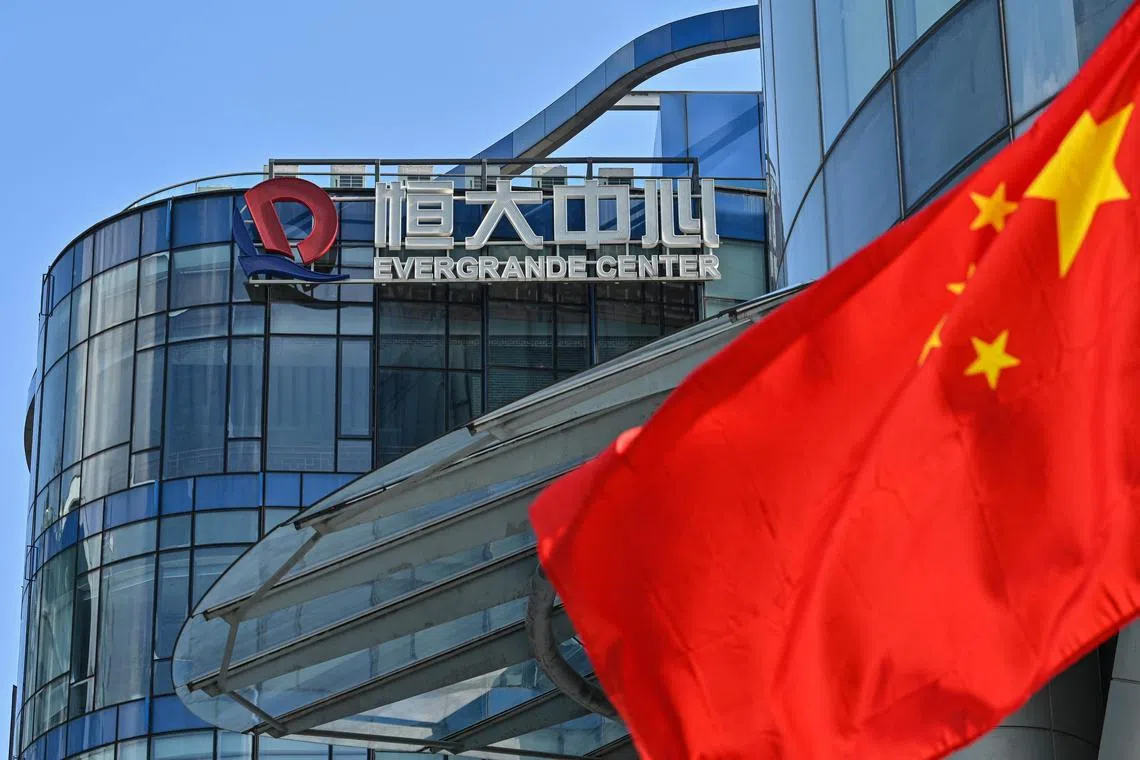Evergrande liquidation a big test for international creditors
Sign up now: Get ST's newsletters delivered to your inbox

An unfavourable outcome for Evergrande's foreign investors risks exacerbating already acute pessimism towards China.
PHOTO: AFP
Follow topic:
HONG KONG - China Evergrande Group’s liquidation order
Key is whether the Jan 29 ruling will be followed in mainland China, which has a separate legal system. While Evergrande’s shares and dollar bonds are traded in Hong Kong, the bulk of Evergrande’s US$242 billion (S$324 billion) of assets are located in the mainland.
Few expect the process to be straightforward – there is no precedent for a company the size of Evergrande to be wound up by a Hong Kong court, and the firm has multiple units.
Yet, an unfavourable outcome for foreign investors risks exacerbating already acute pessimism towards China, as well as undermining Hong Kong’s role as a vital fund-raising centre for the nation’s companies.
“International investors will be watching closely to see if mainland courts accept the Hong Kong court’s ruling,” said Mr Lee Kher Sheng, Asia-Pacific co-head of Alternative Investment Management Association, whose hedge and private credit fund members collectively oversee more than US$3 trillion.
“That could set an important precedent regarding Hong Kong’s ability to have its legal judgments enforced in China.”
The uncertainty underscores the growing concern among investors that their interests will always be secondary to those of the Communist Party.
Abrupt crackdowns on the private industry from property to tech have hammered stock valuations, along with concern over an economic slowdown.
Last week, the Hang Seng China Enterprises Index of stocks in Hong Kong fell towards its lowest level since 2005.
Prices of Evergrande’s shares and bonds suggest holders have little faith in recovery. Its shares fell to 16 HK cents (S$0.027) before they were halted on Jan 29, a fraction of its initial public offering price of HK$3.50 in 2009.
Most of Evergrande’s dollar notes have been indicated at about 1.5 cents on the dollar, according to Bloomberg-compiled data.
Hong Kong’s insolvency proceedings have limited recognition in China, whose courts may also appoint administrators in their own jurisdictions.
“The liquidation order should have very limited immediate impact on Evergrande’s onshore operations or assets,” said Mr Brock Silvers, managing director at private equity firm Kaiyuan Capital.
“While the liquidator will likely be able to assert control over offshore assets, its authority won’t be recognised onshore.”
Chinese officials have also made it clear in the past that they favour the completion of unfinished property projects and paying off contractors over creditor interests – a priority seemingly backed by Evergrande.
“The company has made all efforts possible and is sorry about the winding-up order,” Evergrande chief executive Shawn Siu said in a statement.
“The company will ensure home deliveries and steadily promote normal operation of the group.”
It will also communicate with the appointed liquidator, he added.
The rise and fall of Evergrande illustrates the central role Hong Kong has played in the development of China’s private enterprise.
Chairman Hui Ka Yan founded Evergrande in 1996 in the nearby city of Guangzhou, but it was Hong Kong’s deep capital markets and access to international investors that supercharged the company’s growth.
In the decade after the company’s listing, its shares surged as much as 800 per cent to be among Asia’s hottest investments, while Chinese property junk debt – led by Evergrande – turned into one of the most profitable and popular corporate bond trades globally.
Mr Hui became one of the world’s richest people.
After President Xi Jinping cracked down on leverage in the property market in 2021, Evergrande – with more than US$300 billion of liabilities – foundered.
China’s junk bond market collapsed as investor confidence in the ability of firms to repay dwindled. Like many of its peers, Evergrande defaulted on its debt.
In 2023, Mr Hui was placed under police control on suspicion of committing crimes.
Regardless of how mainland courts respond, the liquidation – led by Alvarez & Marsal – will be a challenging process.
Most Evergrande projects are operated by local units, making it difficult for the offshore liquidator to seize. More than 90 per cent of the company’s assets are located in mainland China, according to a court filing.
The winding up of Evergrande is uncharted waters, said Alternative Investment’s Mr Lee. “This will be a complex, multi-year process with many open questions.” BLOOMBERG

